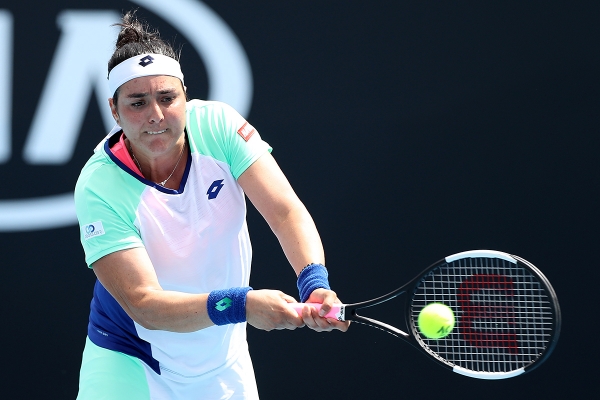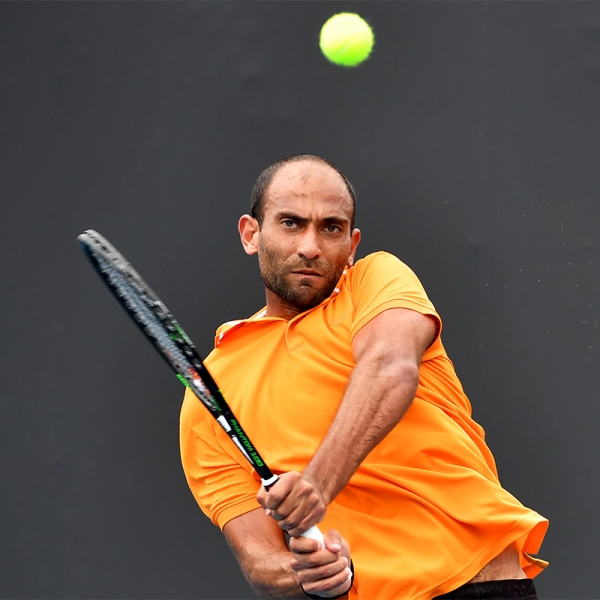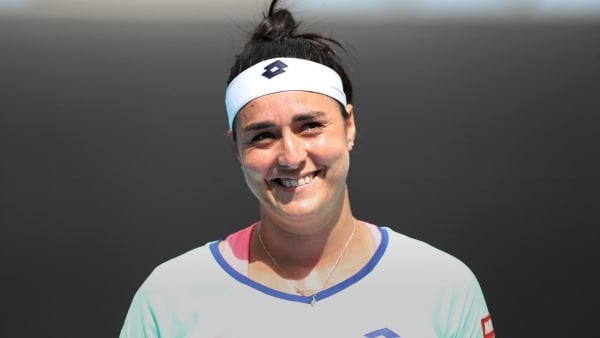Before the start of the 2020 season, Ons Jabeur held a kids’ clinic in Monastir, a coastal city at her home country of Tunisia, where she got to spend time with young tennis players dreaming of following in her footsteps.
“I saw how the children were looking at Ons. It was for me amazing,” Jabeur’s husband and fitness trainer Karim Kamoun told ausopen.com.
“A child went to his mom and said, ‘I touched Ons, I’m not going to wash my hands for a week’. It was a proud moment for me to see that.”

The 25-year-old Jabeur is the most successful female tennis player, not just from Tunisia, but the Arab world as a whole. When she beat Dominika Cibulkova – ranked No.7 at the time – in the Roland Garros second round in 2017, she became the first Arab woman in history to reach the third round at a Grand Slam.
She replicated that feat at last year’s US Open, and also in Melbourne this week, where she took out No.12 seed Johanna Konta and Frenchwoman Caroline Garcia. She will now face 2018 champion Caroline Wozniacki in the last 32 on Friday.
“It’s the first time for me to make the third round in Australia, and hopefully this time will be the charm, because I always make it to the third round then … I don’t want to say the word,” joked Jabeur, who is as famous for her sense of humour as much as she is for her deadly drop shots.
The highest-ranked Arab woman in tennis history – she peaked at 51 in the world last season – Jabeur knows that she is representing an entire region every time she steps on the tennis court.
Last December, she was honoured at the Arab Women of the Year ceremony in London for her achievements in the sport so far. The former Roland Garros junior champion did not realise how big of a deal that was until she saw the massive media coverage that followed and the reaction she received on the back of it.
“At the ceremony, I met a lot of successful Arab women, from different fields, it was amazing. I really felt that we’re improving, we’re getting there, and we are gaining a higher status and gaining recognition across the globe,” Jabeur said.
“When I’m playing at the Grand Slams or anywhere, I try to show that this is the Arab woman, this is what we are. I don’t see any difference between me, or any European or American woman. For me, I’m happy I’m giving this good example and hopefully I can inspire more ladies, in any field, to believe in their dreams and achieve their dreams.”
Jabeur was not the only Arab or North African in action at Melbourne Park this year. In the women’s qualifying draw, Egyptian debutante Mayar Sherif featured in the first round, and her compatriot Mohamed Safwat made it through his three qualifying matches to become the first player from Egypt since 1978 to make the Australian Open main draw.
Jabeur was courtside for Safwat’s final qualifying round, supporting her fellow North African, and cannot wait to see more players from the region make it to the tour.
“I hope we could inspire other players to come and play here or any other Grand Slam. It’s not impossible, we made it, so they can make it too,” she says.
Jabeur’s game is a tricky mix of power and flair. She drives her opponents crazy with her smooth slices and drop shots, but can also hit big on demand when necessary. Her journey to the game’s top flight is as unique as her style, and it’s not easy to analyse why she was able to make it through, hailing from the Arab region, while many others failed to do so.
“Because she has the why, why she is playing tennis,” says Kamoun.
“Not the why, ‘I’m playing tennis because I love tennis’, but she feels like she has a reason, motivation and responsibility towards her family. She’s doing it for her family, friends, for Tunisia too. She’s the best player in Tunisia, and in Africa, so she has to be a role model and to do it for them.
“She made a good choice to believe in herself and she went with her intuition. She knows what to do.
“When she got married, everybody said, ‘Oh, Ons is finished, forget about her tennis’. No. She got married because she wanted to be stable in her life. Also I’m an athlete, I used to be a professional in fencing, so I know what kind of support she needs.”

Jabeur has set herself some big goals for 2020, where she hopes to break the top 20 for the first time, and qualify for the WTA Elite Trophy in Zhuhai. She laments the fact that she didn’t set herself such high targets after her breakthrough 2018 season, which she finished by reaching her first WTA final in Moscow. She’s now ready to dream big, and knows Tunisia, and the Arab world, will be watching.
“The sport has witnessed a lot of progress back home,” says her husband. “Everybody now is following Ons. I was shocked after the match here in Australia, everybody was texting me, and it’s the middle of the night in Tunisia. I’m like, ‘You guys aren’t sleeping?’ They’re like, ‘Of course we’re watching, she’s a role model’.
“Ons is representing Tunisian women. She is strong, she is open-minded, you see how she’s friendly, and she’s strong on the court, she has character. And that’s the character of an Arab woman, she is the boss, and that’s what she’s showing the world.”
Jabeur is preparing herself for a tough clash against Wozniacki on Friday. She lost a tight two-setter to the Dane at Indian Wells in 2015, and was reminded by the press on Wednesday how much Wozniacki likes to run down balls and gets everything back.
“If she wants to run, we’ll make her run,” said Jabeur with a laugh. She says she will try not to think about the fact that this is Wozniacki’s very last professional tournament of her career, and that victory for Jabeur means she would be sending her opponent into retirement.
“If it has to be done then it’s going to be done. I’m obviously playing for myself really, not thinking about anything because probably it’s her moment, so I’m not going to take that away from her, and whatever happens, happens,” said the affable Tunisian.
Reflecting on the progress she feels she has made both mentally and physically to reach this new milestone in Melbourne, Jabeur added: “I think 2019 gave me the opportunity to learn more about myself and maybe I’m mentally growing up, thinking differently, playing differently, even in practice I’m practicing differently.
“For example, before, if I felt any pain, I wouldn’t say I gave up easily, but like I didn’t want to suffer, I was afraid to suffer. But this time if I stay five hours on court I don’t care, I’m there.
“Even if I have something on my mind, I’m going through with it. I’m thinking differently, more motivated, it’s something I’ve been looking for, plus I’m doing it for me, for my country, for my family, for everyone I love.”
